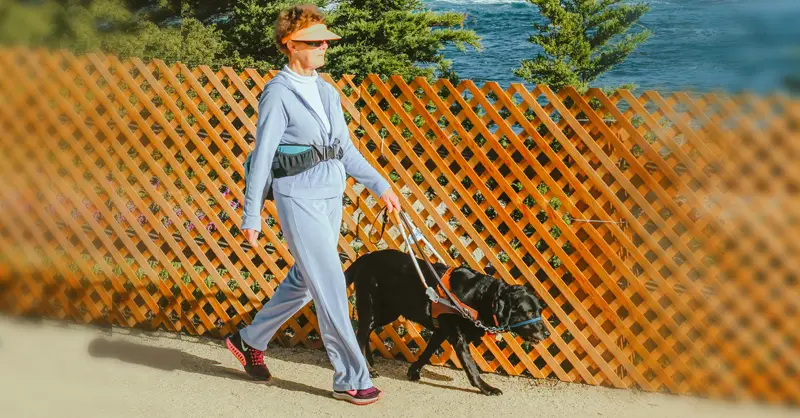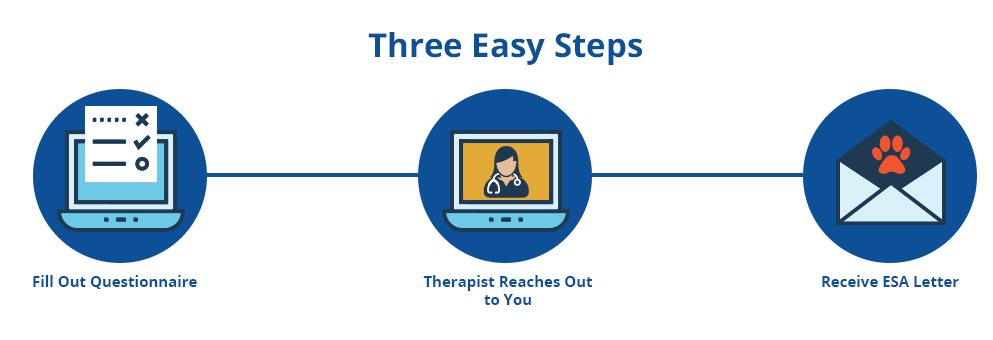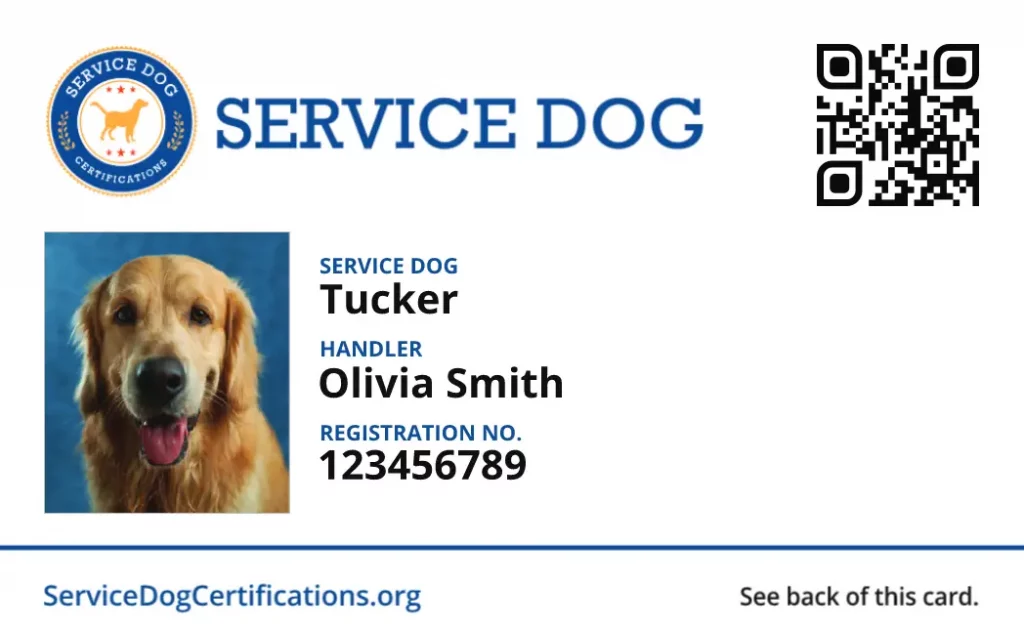Home Page › Blog › California Service Dog Requirements
California Service Dog Requirements

California allows people with disabilities to live, travel, and go about their daily lives in the presence of a service dog. Service dogs are afforded certain rights in the State of California that allow them to access public spaces that normally don’t allow pets.
Californians are protected by both federal and state laws, including under the Americans with Disabilities Act (ADA) as well as California’s Unruh Act (Civil Code, sections 51–51.2) and Disabled Persons Act (Civil Code, sections 54–55.32).
Read on for more information on California Service Dog requirements and regulations.
Definition of a service dog
Service Dog: Any canine trained to perform a disability-specific task for a person with a physical or psychiatric disability.
Service dogs used for mental health conditions are known as Psychiatric Service Dogs.
What is a disability: For legal purposes, disability is defined as a physical or mental impairment that substantially limits a major life activity (such as the ability to work, socialize, or attend school). Physical disabilities include health issues like limited mobility, visual impairment, seizures, and hearing loss. Qualifying psychiatric conditions include debilitating depression, chronic anxiety, PTSD, autism, and learning disabilities, among others.
How is a service dog trained?
To be considered a service animal, a dog must be individually trained to perform a job or task-specific to the handler’s disability.
Federal vs California rules: One difference between California’s rules and the ADA is that service dogs in training are not covered under the ADA. However, under the California Disabled Persons Act, individuals who train service dogs can bring their animals to any public place in order to train the dog and provide a disability-related service.
Who can train a dog: Dogs can be trained by the person with the disability, by a professional trainer, or with the help of a training organization. Note that in California, it is perfectly acceptable for a handler to train a service dog on their own.
Identification requirements for service dogs in California
Visible identification: Most service dog owners use service dog paraphernalia like ID cards, vests, tags, and certificates to signal to others in public that their dog is special. It is not mandatory either under California or federal rules to have an identification card or vest on your Service Dog, but handlers frequently use them for personal convenience. These items can prevent intrusive inquiries and unwanted interaction with the service animal while on duty.
Disability verification: Staff at venues and landlords cannot demand documentation as a condition of entry. In California, they can ask two questions to validate whether you have a service dog (and only if the disability is not obvious):
1. Is the animal a service dog required for a disability?
2. What work or task has the service dog been trained to perform?
Service dog registration in California
California does not require the registration of service dogs. There may be registration requirements that generally apply to all dogs that reside in your area, but they are not service-dog specific. Service dog owners, however, choose to voluntarily register their dogs for several reasons.
What it’s for: Registering a service dog with a service like Service Dog Certifications enters the dog’s information into a searchable database linked to an ID card. The ID card can be used as one way to signal to others that you own a service dog or be presented when third parties unaware of service dog verification rules continually insist on seeing documentation.
Psychiatric service dog requirements
Psychiatric service dogs are recognized as service dogs in California with all the same rights and benefits of ownership.
Psychiatric service dogs are still not well appreciated by the general public but are a growing category of assistance animals.
California considers the following as psychiatric disabilities if they substantially limit a major life activity:
- Post-Traumatic Stress Disorder
- Anxiety Disorders
- Depression
- Obsessive-Compulsive Disorders
- Personality Disorders
- Schizophrenia and Schizoaffective Disorder
- ADHD
- Autism
Psychiatric service dogs can perform an amazing number of tasks, including:
- Deep pressure therapy
- Reminding the owner to take medication
- Posting and watching the owner’s back in open areas
- Tactile stimulation
- Alerting the owner to oncoming threats or episodes
- Disrupting repetitive self-destructive behaviors
Service dog vs emotional support dog in California
California also recognizes emotional support animals as a type of assistance animal. An emotional support animal (ESA) alleviates symptoms of a mental or emotional health condition.
SD vs ESA: There are major differences between ESAs and service dogs.
- ESAs do not require any specialized training.
- ESAs are protected under the Fair Housing Act, not the ADA, so the benefits extend primarily to housing rights and do not come with public access rights.
- While service dogs can only be dogs, ESAs can be dogs, cats, birds, gerbils, fish, turtles, and other small household pets.
To qualify for an emotional support animal in California, you need an ESA letter from a California-licensed mental health professional. See if you qualify for an emotional support animal letter by completing the online questionnaire below.

You and your service dog in California
Service Dog handlers in California have generous rights. These include:
- Public access (venues, outdoor areas, etc.)
- Access to public transportation
- Access to aviation (including in the cabin on airplanes)
Having a service dog in California is a major responsibility. Properly training a service dog can be challenging, and service dog owners are expected to have their animals under control at all times. Of course, as a reminder, California law prohibits misrepresenting a pet dog as a service dog.
As a service dog owner, it’s important to be aware of your rights and how to conduct yourself during proper service dog verification requests by third parties. Registrations, certificates, ID cards, tags, and vests can’t replace these procedures, but they can help ease the process and give the public an easy way to recognize your companion as a service dog.
About the Author: The writing team at Service Dog Certifications is made up of folks who really know their stuff when it comes to disability laws and assistance animals. Many of our writers and editors have service dogs themselves and share insights from their own experiences. All of us have a passion for disability rights and animals.
135 comments
Leave a Reply Cancel reply
Latest Posts

How to Bring a Service Dog to Disneyland
Trained service dogs are more than welcome to join their handlers at Disneyland. In this guide, we’ll explain Disneyland’s policies and give practical advice for bringing a service dog to Disneyland for the first time. Disneyland’s Service Dog Policies The Magic Kingdom is happy to welcome trained service dogs across most park locations! They kindly […]

Read More

Can Dogs Eat Tomatoes?
Yes! Dogs can safely enjoy tomatoes, but there are a few risks to be aware of so you can feed your dog responsibly. Fully ripe tomatoes (without the stems and leaves) can actually have nutrients that are good for your pup. Tomatoes have chlorogenic acid, an antioxidant that can have anti-inflammatory effects in cells. They’re […]

Read More

Can a Primary Care Doctor Write an ESA Letter?
Your family doctor, also called a primary care physician (PCP), can write a letter recommending an emotional support animal. We’ll explain what legally gives them that ability and explore what better options might be available for you. Why are Physicians Able to Write an ESA Letter? To turn your pet into an emotional support animal, […]

Read More









My question is, can someone deny a dog into a taxi or uber if the dog is not properly identified as a service dog? I understand it is not mandatory in CA to identify a service dog however, I have seen service dogs properly identified at restaurants and malls where you obvious know that it is a working dog. My concern is if the person is not stating that it is a service dog or properly identifying the animal can the driver of the uber or taxi deny access for the dog?
I was told by a Urber driver himself..that when they start working there they have to sign a paper agreeing to let animals in there vehicles of they refuse then you just make sure to post that on the comment area..my daughter has a service dog n i have a card n paper now and this homeless shelter is giving me BS on having her dog here at the house with my daughter we are new to California so all her dogs info is on a ADA site where i can keep address and info up too date..but so far i have had no trouble with any Urber drivers n thats not even showing her card..butt as he said they are to sign a paper when theu start..so leave a comment or contact Urber and tell them who denied you..
Im not sure if this is the way to contact you seeking help or seeking a service dog for myself. I am a hard of hearing person. I also have a hip replaced which Im very careful with my steps but really sometimes need assistance. I am living with my son and family but I will br moving to live alone. I am 71years old although Im feeling strong but my poor hearing is my very much concerned. I’ve been adviced to contact different organizations. Im not sure if you are my right one. Others recommended by AARP are not taking applications.
I would like and appreciate it if you reply to this inquiry
Thank you, Maria Lopez
I’d suggest that you talk with your doctor or therapist to figure out if a service dog would work for you. Together you could figure out what kind of tasks your service dog could perform for you. You may find this article on how to get a service dog interesting: https://www.servicedogcertifications.org/how-to-get-a-service-dog/
An ACTUAL Service Dog is required full access. Which means yes, he is required to allow an ACTUAL service dog. An ACTUAL service dog is not required to have identifying vest, nor documentation. You cannot be asked for it either. Only TWO questions can be asked. Is that a service dog? and What tasks has the Service dog been trained to perform?
One thing I ask of you or ANYONE reading this feed. PLEASE do not say your animal is a Service animal if it is not. If it barks, whines, cries… or goes crazy when another animal or human gets near you, etc. that is NOT a trained service dog, and you mess it up for people like myself who have a legitimate trained serviced dog that has good manners and knows what is expected of them in public.
Also, if you have an ACTUAL service dog, then you would already know the ADA law. Its part of your training.
EXACTLY, too many scummy people buying fake credentials online from lowlifes selling anything for a Quick buck!
À dog with a bunch of overly conspicuous « service animal » paraphernale is most likely frauduleuse
Our child has a diagnosed anxiety disorder, autism spectrum disorder and ADHD. They are 16 and have trouble regulating their emotions. I am thinking a service dog would be very helpful. We already have 2 smaller dogs. (Terrier chihuahua mixes) Can you have a service dog when you have other dogs and where can I get one and how do I make sure they are reputable and truly training them in a humane and legitimate way?
Hello,
I just was wondering if any of you guys have had or trained a CAH service dog?
I have a border collie lab has any of you guys trained one?
I am thinking about training her my self so any recommendations?
I’m training a border collie right now they’re extremely intelligent need a lot of exercise yours is probably better being a mixed breed it will be calm and listen to what you’re saying. They are supposed to be about the best assistance there are. Border Collie’s are almost intelligent as a human. They can identify 2000 different toys and different colors of hundreds of bars there’s a special on YouTube about a A famous border collie interviewed on 60 minutes. He pretty much can do anything. Congratulations I wish you the best of luck it takes a lot of patience but it’s really worth it in the long term you have a loyal, non-judge mental , best friend that will do anything for you. There’s really nothing better than that🐕🦺
My son suffers from bipolar disorder Can a service dog help his condition.
Your son may qualify for a Psychiatric Service Dog. Talk to his doctor about getting a PSD and see if you can identify tasks the service dog could actively assist your son with. You may find this article on Psychiatric Service Dogs interesting: https://www.servicedogcertifications.org/psychiatric-service-dog/
My daughter struggles with mental health issues. diagnosed with MDD and GAD, has had 2 hospitalizations due to self-harm and suicidal ideation. She misses more school than she attends because she has panic attacks. How can I help her with a limited income to benefit with a dog- especially taking it to school.
You can get an esa. And emotional support animal. You do have to get a prescription from your doctor or therapist. But you can train it ypurself to reduce costs. The down side is that as an esa and not a service dog they wont be welvome in most businesses. However landlord cannot turn away a prescribed pet.